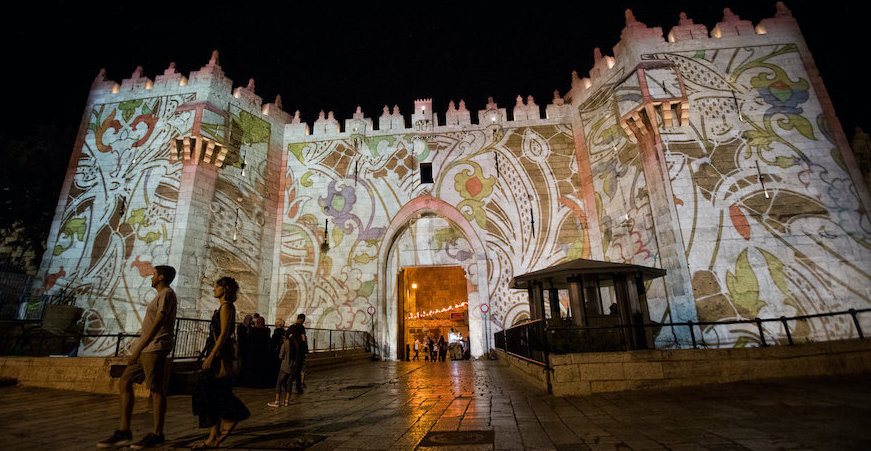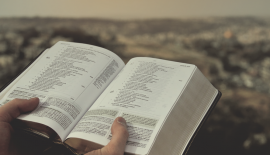The Lord Loves Zion
With enigmatic staccato, Psalm 87 throws assertions at its readers that at first glance seem incoherent. This Psalm seems like a bundle of fragments of thoughts that confuses rather than provides orientation.
“Psalm 87 provides a revelation, an apocalypse; it discloses a secret”
Interpreters who have studied Psalm 87 admit a prophetic quality to it. It is claimed that this Psalm explains interrelations from a perspective that is not visible to the natural eye. Psalm 87 provides a revelation, an apocalypse; it discloses a secret.
The seven verses can be divided into two sections: The first section (verses 2-3) describes ‘the beloved, holy and highly revered Zion’. The second section (verses 4- 6) underlines the statement that “all men have a right to be considered children of Zion”. These two main parts are framed by a heading (verse 1) and a conclusion (verse 7). The last verse resounds the words of the singers and dancers going up to Zion.
What is ‘Zion’?
According to the Midrash, the ‘holy mountains’ are Mt Sinai and Mt Moriah. “It was upon Mt Moriah that there stood the Temple in which reposed the Law that came from Sinai. Therefore Moriah can be regarded as a continuation of Sinai”.
If this Psalm has its ‘foundation in the holy mountains,’ that is, in Zion, then it consequently originates in and is based upon the will, the word and the dealings of the one, true and living God – like everything ‘founded in Zion’.
The Lord is the One who ‘chooses Jerusalem’. He says (Isaiah 28:16): “Behold, I found a stone in Zion, an even bochan – a stone that puts on the test, a testing stone, a generally applicable standard – a precious cornerstone as a foundation, which is firmly established.”
The Lord Loves the Gates of Zion
This is the simple, sufficient and inscrutable reason for the Lord’s choosing of Israel. Love is neither questionable nor rationally comprehensible. Until the last book of the New Testament, Jerusalem is simply ‘the beloved city’ (Revelation 20:9). The choice of words here in Psalm 87 emphasises “the continuing love relationship” (ohev, not ahav!) of God with the gates of Zion, marked by faithfulness.
‘The Lord loves the gates of Zion’ as a dwelling for His people ‘more than all the dwellings of Jacob’ in the whole world”
The gates represent the whole of the city. Those who love a city often enter and leave through its gates. But perhaps the gates are mentioned here already in the hopeful prospect of the abundance of people who will enter Zion through them.
The Pearls of the City
In Revelation 21, the seer John (Hebrew ‘Jochanan’) describes the New Jerusalem coming down ‘from God out of heaven’, ‘like a bride adorned for her husband’ (verse 2). “It pertains the glorious presence of the [one, true, living] God” (verse 11), the ‘shekhinah’. To describe this phenomenon, the New Testament seer uses comparisons with precious stones (verses 11b,18-20). He sees ‘twelve gates’ as ‘twelve pearls. Each of the gates is made of a single pearl’ (verse 21).
The penultimate chapter of the ‘Christian Bible’ sees ‘the names of the twelve tribes of Israel’ engraved on the gates of Jerusalem (Revelation 21:12). ‘The splendour and wealth of the gentile nations’ are brought into the spiritual centre of Israel (verse 26). From there, the nations will finally experience healing (Revelation 22:2).
Every love is always ‘more than’ and distinguishes between ‘all the others’ and the beloved. Love is exclusive by definition. An attitude which does not distinguish, emphasise, choose, and consequently in some way exclude everything else, is ‘objectivity,’ ‘neutrality,’ which treats, all the same, is ‘indifference’ – i.e., the exact opposite of love. In the end, there is no way out but to stand before the mystery of God’s love, to accept it as inexplicable.
‘Aliyah’ is God’s Will
There is another aspect that is important for the course of the content of Psalm 87: The overwhelming majority of the people of Israel, here referred to as ‘Ya’akov’, have lived outside the land of Israel ever since the beginning of the Babylonian captivity in the 6th century BC. Since then, they never returned to the land, as Ezekiel (39:28) prophesied: “I have gathered them unto their own land, and have left none of them any more there.” This is true even today, though in recent years, for the first time in more than two and a half millennia, the largest Jewish community worldwide has been living in the land of Israel.
Today the majority of the Jewish people still live outside the Promised Land. Jews felt and still feel so comfortable in the diaspora that in the vast majority of cases, they only emigrated to the land of Israel when they had no other option.
A crucial aspect of Psalm 87 is the return of the people of Israel to the land of Israel. With this in mind, the Psalmist makes it fundamentally clear at this point: ‘The Lord loves the gates of Zion’ as a dwelling for His people ‘more than all the dwellings of Jacob’ in the whole world.
In plain language: ‘Aliyah’, the going up to Zion, the immigration of the Jewish people into Israel, corresponds to the will of God.
See also: www.gerloff.co.il/en/english






